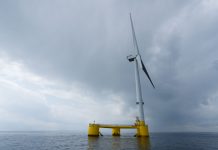With a pivotal UN Climate Change Conference set to convene October 31 in Glasgow, Scotland, pressure is building for nations to accelerate the pace of clean energy innovation. Against this backdrop, the United Kingdom ranks among the top contributors to the global energy innovation system relative to its potential, according to analysis by the Information Technology and Innovation Foundation (ITIF), a think tank for science and technology.
Finland, Denmark, Sweden, and the United Kingdom are the top four among 34 nations ITIF assesses in its 2021 Global Energy Innovation Index. Meanwhile, although the United States remains the largest contributor in absolute terms, it has faltered relative to its potential—dropping from 4th in a 2016 baseline ranking to 17th in the new index. China lags even further behind in relative terms, ranking in 25th place.
The United Kingdom ranking rose to fourth overall, compared to its previous ninth-place ranking in 2016. The UK also ranks first in social legitimation and international collaboration, holding the top spot in 2016 as well.
The 34 nations in ITIF’s index together invested more than $27 billion in clean energy R&D in the most recent year for which data is available—which was 25% more than 2015, but essentially flat accounting for economic growth.
“Despite the contributions from a few pacesetting countries like the United Kingdom, we are seeing a distinct lack of urgency globally, which undermines any real chance of achieving the UN goal of net-zero emissions by 2050,” said David M. Hart, director of ITIF’s Center for Clean Energy Innovation, who co-authored the report. “National governments must take responsibility for driving clean energy innovation because there is no international entity with the resources to fund energy innovation at the requisite scale, while the private sector lacks the incentive to do so.”
ITIF’s 2021 Global Energy Innovation Index is comprised of 20 indicators grouped into three subindices assessing countries’ contributions to the global energy innovation system based on their levels of knowledge development and diffusion, entrepreneurial experimentation and market formation, and social legitimation and international collaboration. Broadly, the analysis identifies several clusters of performance:
ITIF’s Global Energy Innovation Index: overall and subindex rankings
|
Overall Index
|
2021 Subindex Rankings
|
|||||
|
2021
Rank |
Country
|
2016
Rank |
Change
|
Knowledge Development & Diffusion
|
Entrepreneurship, Experimentation, & Markets
|
Social Legitimation, Collaboration
|
|
1
|
Finland
|
1
|
0
|
4
|
1
|
14
|
|
2
|
Denmark
|
2
|
0
|
1
|
9
|
2
|
|
3
|
Sweden
|
3
|
0
|
10
|
2
|
19
|
|
4
|
U.K.
|
9
|
+5
|
8
|
6
|
1
|
|
5
|
Switzerland
|
8
|
+3
|
16
|
3
|
4
|
|
6
|
Belgium
|
10
|
+4
|
3
|
11
|
9
|
|
7
|
Netherlands
|
5
|
-2
|
14
|
4
|
3
|
|
8
|
Germany
|
11
|
+3
|
7
|
8
|
16
|
|
9
|
Canada
|
13
|
+4
|
13
|
5
|
11
|
|
10
|
France
|
6
|
-4
|
11
|
10
|
7
|
|
11
|
Norway
|
23
|
+12
|
6
|
16
|
17
|
|
12
|
Japan
|
19
|
+7
|
2
|
19
|
25
|
|
13
|
Austria
|
12
|
-1
|
15
|
13
|
10
|
|
14
|
S. Korea
|
22
|
+8
|
5
|
21
|
21
|
|
15
|
Australia
|
17
|
+2
|
20
|
7
|
15
|
|
16
|
Czech Rep.
|
18
|
+2
|
17
|
14
|
20
|
|
17
|
United States
|
4
|
-13
|
9
|
12
|
31
|
|
18
|
Portugal
|
7
|
-11
|
19
|
17
|
12
|
|
19
|
Italy
|
16
|
-3
|
18
|
27
|
18
|
|
20
|
Slovak Rep.
|
24
|
+4
|
23
|
15
|
13
|
|
21
|
Hungary
|
25
|
+4
|
26
|
23
|
6
|
|
22
|
Spain
|
21
|
-1
|
24
|
26
|
8
|
|
23
|
Ireland
|
24
|
-9
|
25
|
30
|
5
|
|
24
|
Lithuania
|
34
|
+10
|
27
|
22
|
23
|
|
25
|
China
|
30
|
+5
|
12
|
31
|
34
|
|
26
|
Poland
|
15
|
-11
|
28
|
24
|
26
|
|
27
|
Brazil
|
26
|
-1
|
22
|
20
|
32
|
|
28
|
Greece
|
31
|
+3
|
32
|
18
|
30
|
|
29
|
Mexico
|
27
|
-2
|
33
|
25
|
24
|
|
30
|
Estonia
|
20
|
-10
|
21
|
32
|
27
|
|
31
|
Chile
|
29
|
-2
|
29
|
29
|
28
|
|
32
|
India
|
33
|
+1
|
30
|
33
|
22
|
|
33
|
New Zealand
|
28
|
-5
|
34
|
28
|
29
|
|
34
|
Turkey
|
32
|
-2
|
31
|
34
|
33
|
Other findings:
- Denmark ranks first for knowledge development and diffusion; Finland is top for entrepreneurial experimentation and market formation; and the United Kingdom sets the pace for social legitimation and international cooperation.
- Only Denmark and the United Kingdom rank in the top 10 across all three subindices.
- The United States ranking fell across all subindices, moving its overall fourth-place ranking in 2016 to 17th in 2021.
- China ranks 25th overall, improving its position five places since 2016, but sits at or near the bottom of the subindices measuring entrepreneurial experimentation and market formation, and social legitimation and international collaboration.
- Overall, nations have invested more in cleantech research and development than in commercial deployment.



